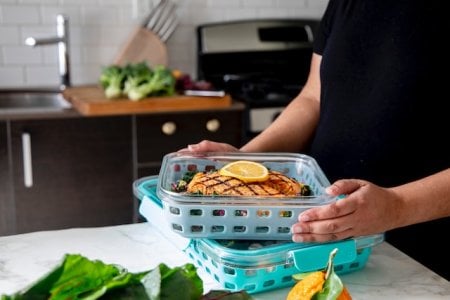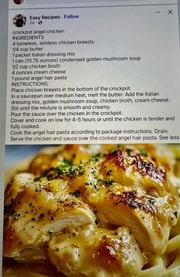Discover these effortless meal-planning tips and save money, time, and food!
By
Seia Ibanez
- Replies 2
The cost of our groceries is one burden we have in our daily lives. And with the rising cost of living, keeping our budgets on track can be difficult.
On top of this financial cost, think of the time we spend grocery shopping each week, which is wasted when food ends up being thrown away.
Food waste—it's an incredibly costly habit.
Ruby Wake, Sustainability Manager of the global food charity OzHarvest, said up to 10 per cent of global greenhouse gases come from food produced but not eaten.
The good news is there’s a solution: meal planning.
It is an effective strategy to save money, reduce food waste, and give us more time each week. Sounds almost too good to be true, doesn’t it?
But Ruby promised us that meal planning can help us with all this and more—and it isn’t as daunting as it sounds.
‘Coming up with meal ideas every day isn't necessarily everybody's idea of a good time’, she explained.
She suggested taking a look at your fridge, freezer, and cupboard before you go shopping. You never know what incredible meals you can make with stuff you already have in your home.
'If people are stuck on what to cook, we have a whole heap of “Use It Up” recipes on our website, using the most commonly wasted ingredients in Australia,' she said.
Ruby added that recipe generators are also available online–just type the ingredients you have on Google, which will help you generate some recipe suggestions.
When starting to meal plan, Ruby suggested starting small.
‘Pop a weekly reminder in your phone to go through your food and figure out what you need to use up, then build meals from there,’ she said.
Start with two meals, then add a couple of days for leftovers. And always leave at least one day of the week free.
‘It's really important to be generous for yourself—plans might change, you might get invited out for dinner, or be too tired to cook and want to order takeaway,’ Ruby added.
‘Part of meal planning is not to plan, leaving space for change.’
If you have trouble remembering what food needs to be used first, Ruby recommended organising your fridge so consumables next in line are at the front and centre.
She also suggested adding bright tape to food containers or even designating an entire shelf just for food that needs to be eaten soon.
‘It's a visual reminder for the whole household and a great meal-planning hack,’ Ruby said.
If you want quick but healthy meals, Dietitian Kate Hilton shared her kitchen must-haves for whipping up a balanced meal in minutes if you want quick but healthy meals. She said preparing a healthy meal can be easier if your kitchen has the essential foods.
What’s always in her kitchen? Check the story out here to find out.
While throwing food away may seem like a small thing, it all adds up.
According to the think tank The Australia Institute, Aussie households waste $19.3 billion of food annually–the equivalent of 152 Sydney Harbour Bridges or 7.6 million tonnes of food thrown out, around $2,000 or $25,000 per household.
That’s why meal planning is just one of the many simple strategies you can incorporate into your daily lives to address food waste and save money down the line.
 Members, have you tried meal planning? Did it save you a lot on your expenses, time, and energy? Share your thoughts with us in the comments below!
Members, have you tried meal planning? Did it save you a lot on your expenses, time, and energy? Share your thoughts with us in the comments below!
On top of this financial cost, think of the time we spend grocery shopping each week, which is wasted when food ends up being thrown away.
Food waste—it's an incredibly costly habit.
Ruby Wake, Sustainability Manager of the global food charity OzHarvest, said up to 10 per cent of global greenhouse gases come from food produced but not eaten.
The good news is there’s a solution: meal planning.
It is an effective strategy to save money, reduce food waste, and give us more time each week. Sounds almost too good to be true, doesn’t it?
But Ruby promised us that meal planning can help us with all this and more—and it isn’t as daunting as it sounds.
‘Coming up with meal ideas every day isn't necessarily everybody's idea of a good time’, she explained.
She suggested taking a look at your fridge, freezer, and cupboard before you go shopping. You never know what incredible meals you can make with stuff you already have in your home.
'If people are stuck on what to cook, we have a whole heap of “Use It Up” recipes on our website, using the most commonly wasted ingredients in Australia,' she said.
Ruby added that recipe generators are also available online–just type the ingredients you have on Google, which will help you generate some recipe suggestions.
When starting to meal plan, Ruby suggested starting small.
‘Pop a weekly reminder in your phone to go through your food and figure out what you need to use up, then build meals from there,’ she said.
Start with two meals, then add a couple of days for leftovers. And always leave at least one day of the week free.
‘It's really important to be generous for yourself—plans might change, you might get invited out for dinner, or be too tired to cook and want to order takeaway,’ Ruby added.
‘Part of meal planning is not to plan, leaving space for change.’
If you have trouble remembering what food needs to be used first, Ruby recommended organising your fridge so consumables next in line are at the front and centre.
She also suggested adding bright tape to food containers or even designating an entire shelf just for food that needs to be eaten soon.
‘It's a visual reminder for the whole household and a great meal-planning hack,’ Ruby said.
If you want quick but healthy meals, Dietitian Kate Hilton shared her kitchen must-haves for whipping up a balanced meal in minutes if you want quick but healthy meals. She said preparing a healthy meal can be easier if your kitchen has the essential foods.
What’s always in her kitchen? Check the story out here to find out.
While throwing food away may seem like a small thing, it all adds up.
According to the think tank The Australia Institute, Aussie households waste $19.3 billion of food annually–the equivalent of 152 Sydney Harbour Bridges or 7.6 million tonnes of food thrown out, around $2,000 or $25,000 per household.
That’s why meal planning is just one of the many simple strategies you can incorporate into your daily lives to address food waste and save money down the line.
Key Takeaways
- Meal planning can help Australians save money and time and reduce food waste.
- Starting with small steps, like planning just two meals a week and leaving room for changes, can make meal planning less daunting.
- Checking your fridge, freezer, and cupboards can help you use what you already have and reduce grocery costs.
- Organising your fridge and cupboard could help you keep track of items that need to be used and prevent wastage.








